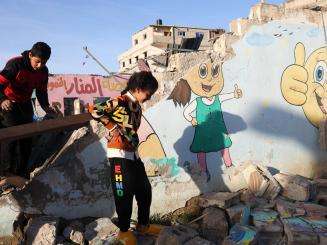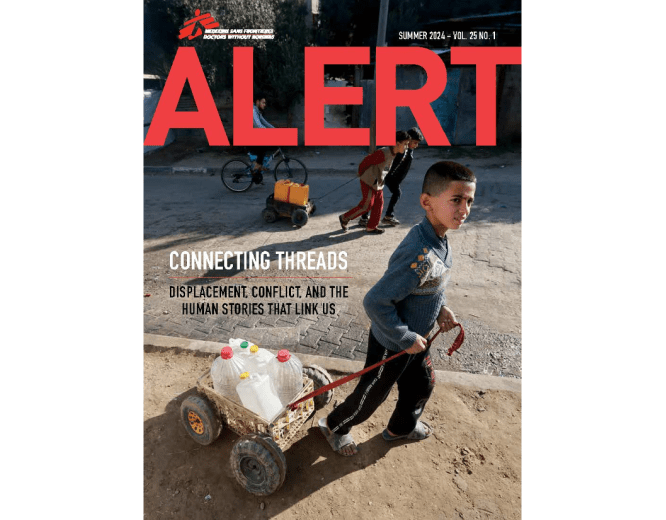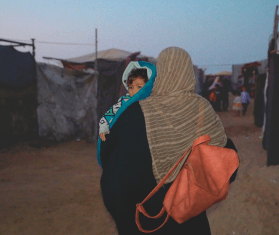Babiker* awoke to the sound of heavy gunfire in his neighborhood. It was April 15, 2023, in the town of Kassala, eastern Sudan. As shots rang out, he remembered rumors about tensions in the country's military forces, including at a base near his home.
Social media soon confirmed his fears—there was shooting and artillery shelling all over the country. Overnight, a power struggle had erupted into warfare between the Sudanese Armed Forces (SAF) and a paramilitary group, the Rapid Support Forces (RSF). Civilians were suddenly caught in a civil war.
"People were shocked," Babiker recalls. "No one was prepared for this conflict."
A Sudanese civil engineer, Babiker has been a water and sanitation manager with Doctors Without Borders/Médecins Sans Frontières (MSF) since 2021. He first worked in a camp in eastern Sudan, helping refugees from the conflict in neighboring Ethiopia's Tigray region. Despite facing decades of instability and political and economic strife, at the time Sudan hosted more than 1 million refugees and asylum seekers from many countries in the region.
Everything changed one year ago on that morning in April, when armed men stormed entire neighborhoods in cities including the capital, Khartoum. Violence soon spread throughout the country. Air- and seaports shut down, and millions of people fled to different parts of the country and beyond. Aid organizations, including MSF, initially relocated many international staff. However we soon sent in new international teams to work alongside Sudanese colleagues to respond to emergency needs.
Like other Sudanese MSF staff, Babiker stayed on throughout. As the conflict continued to shift over the months that followed, he traveled throughout the country to provide urgently needed humanitarian aid. The months became a year. Babiker’s work evolved to meet the ever-shifting dynamics of the conflict and people’s growing needs.

A mass exodus through Port Sudan
At the end of April, Babiker joined a Doctors Without Borders team in Port Sudan, a hub for Sudanese citizens and foreign nationals seeking to exit Sudan. Some were Syrians and Yemenis who had been living in Sudan after fleeing war in their home countries; others were students from Nigeria who attended Sudanese universities. There were many Sudanese people from Khartoum and elsewhere, including employees of foreign embassies and international organizations. Those who could afford it waited a month or longer to take passenger ships to Saudi Arabia.
"The majority of them were just setting up tents next to the Red Sea," Babiker says. “They were suffering with limited access to water. There was no support from the government or any organization. "
The MSF team assessed their needs, donated basic hygiene items, containers for water storage, and medical supplies. Babiker focused on setting up a new base in Port Sudan to coordinate emergency activities throughout the country.
Fleeing south to Wad Madani
As fighting continued throughout Sudan, many more people fled south from Khartoum to the city of Wad Madani, which at the time was still under the control of the Sudanese government. In June, Babiker worked with an MSF team there, supporting several hospitals and sites for displaced people.
In the locality of Al-Hasahisa, the team found 1,200 people sheltering in a school with no food, no medical care, no latrines, and only two water faucets that were both malfunctioning.
"It was a terrible situation," Babiker says. "We decided to directly support them in two different ways—our team started running mobile clinics with doctors, nurses, and midwives. We installed water tanks so people could get water 24 hours a day. We built many latrines. After one month, the situation was quite different."
MSF advocated for food distributions. Despite their needs, people were not asking for much.
As displaced people shared their stories with Babiker, he was struck by the poignancy of helping people with whom he had much in common.
"I put myself in their situation," he says. "I talked with one of them—he was a civil engineer—and I thought, 'That could happen to me.'"

Millions of difficult journeys
From June through August, millions of people fled across Sudan, some finding shelter within its borders while others sought refuge in neighboring countries such as Chad, South Sudan, and Central African Republic.
Soon Sudan's internal displacement crisis became the largest in the world. Since April 2023, more than 8 million people have fled their homes, seeking shelter in one state after another as the fighting moves, or crossing into neighboring countries.
People who had homes and careers now have nothing. Hunger is looming in many areas.
"I remember, when the conflict started, people said it would only continue for three days," Babiker says. "Most of the people who left Khartoum didn't take anything—they left their clothes, their money, everything. You can imagine after one year, it's a catastrophic situation."
Omdurman
In October, Babiker traveled to the city of Omdurman, where his family lived before the war. Despite heavy fighting between SAF and RSF, many civilians remained. He was part of an MSF team offering support to Al Nao Hospital, the only hospital still functioning in the city.
Babiker was struck by the contrasts. Shelling was hitting residential areas, but young people were playing soccer and women were going to an outdoor market, ignoring the explosions.
"For most people, when you hear shelling, you have to hide to protect yourself," Babiker says. "But after six months, it was as if people had become used to this situation."
The staff at Al Nao were government employees who had not been paid since the war began and were struggling to continue working. To help, MSF started providing staff with modest financial support, supported the hospital with medical supplies, and set up a cholera treatment center to boost capacity in the face of the looming threat of outbreaks.
Only half an hour before he was set to arrive one morning, Babiker received a call notifying him that the hospital had been directly shelled. Two people were killed in the emergency department and five more were injured. His supervisor reconsidered the risks and discussed them with Babiker. He would have to leave.
Babiker also joined a team responding to a cholera outbreak spreading in the eastern state of Al Gedaref. Doctors Without Borders was supporting the state's only cholera treatment center as up to 50 new patients arrived each day.

The focus shifts to water
In November, MSF handed over support of the center to another organization and started focusing exclusively on stopping the spread of cholera.
In Al Gedaref, the only water available to displaced people came from small vendors carrying it around in donkey carts. Babiker's team identified about 50 wells that supplied these vendors. Although chlorination was not a common practice, the team offered to test the water and treat it with chlorine to make it safe to drink.
Many of the wells were privately owned. One by one, a team of MSF health promoters persuaded the owners to participate.
"It was very difficult to convince them of the importance of chlorination," Babiker says. "It takes time, but after a while, it became normal and they themselves were asking people to chlorinate the water."

Another flashpoint by the end of the year
By December, cholera cases had declined to fewer than 10 per day, and MSF teams completed their response. Within weeks, however, the neighboring city of Wad Madani was suddenly captured by the RSF, causing thousands of displaced people to arrive in Al Gedaref once more.
Babiker returned to Al Gedaref to assess the needs. His team focused on five sites, delivering water with tanker trucks to people who had lost everything. But there are far more gathering sites for displaced people in just the city of Al Gedaref, and some are receiving nothing, Babiker says.
It is an intolerable situation, even as the war grinds on.
"The only loser of this conflict is the Sudanese people,” Babiker says. “We need the conflict to stop. Then everyone can go back to their homes and we can continue with normal life."
*Full name withheld for privacy
More from this issue of Alert
June 07 09:00 AM
The most dangerous place in the world to be a child
The impact of war on Gaza's children
Read more
April 19 01:47 PM
Saving lives is not a crime
Tommaso Fabbri, MSF’s former head of mission for search and rescue, on a legal case dismissed after seven years in limbo
Read more
June 07 09:00 AM
The journey north
Documenting struggle and determination on migration routes in the Americas
Read more
June 07 09:00 AM
A lesson in climate solidarity from the flooded marshlands of Old Fangak
MSF teams are witnessing firsthand how climate change is already impacting people’s health around the world
Read more

Alert Summer 2024
Connecting Threads: Displacement, Conflict, and the Human Stories That Link Us




